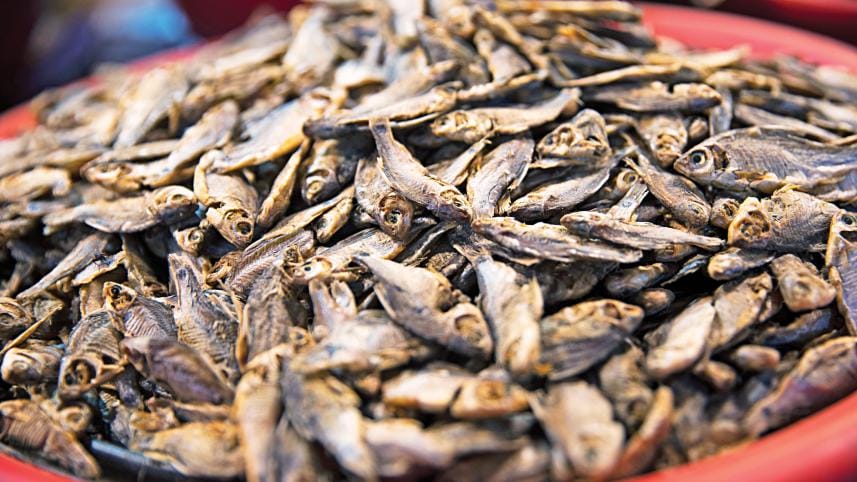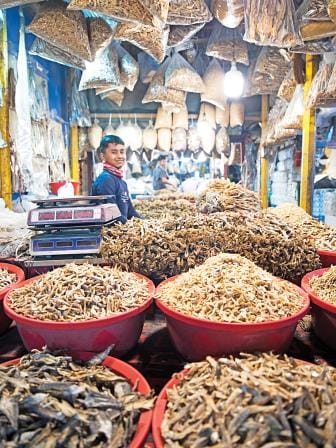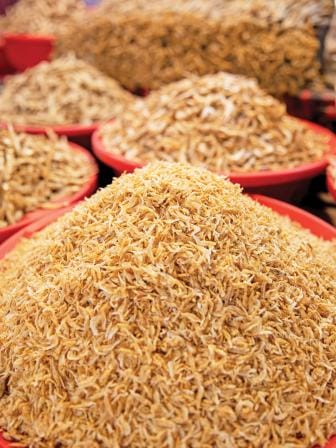The economics of shutki trade

Drying is a common method of food preservation and has been part of human civilisation since ancient times. In many cases, it not only preserves the food but also elevates the taste. Dried fish or shutki maach is a glorious example. In Bangladesh, the popularity of dried fish is rising and there is a thriving shutki trade.
The shutki itself
Shutki maach is made using the age-old method of preservation where the food item is dried in the sun and air, thus removing the water content. This allows for preservation that can make the fish last for months, even years. In Bangladesh, dried fish are commonly made using the native method where the fish is dried under the open sky. Of course, some new farmers are embracing modern methods and using greenhouses to dry fish, but there is a marked difference in taste depending on which process is used.
Some fish are dried as a whole, some are sliced, others are cut open and have their intestines removed; some are salted and some are dried without salt. Different species and sizes of fish are dried using different methods but the essence remains the same — let the sun do its work!
Even a few years ago, shutki was considered a delicacy but people are leaning towards trying new food and experience, and while shutki is an acquired taste for many, it keeps getting more popular in the country.
With many different recipes to try and so many different shutki available to choose from, it's easy to see why many people maintain a special attraction to this particular food.
Tales of the trade
Dhaka might not produce any shutki, but there are multiple trading spots in the city — Karwan Bazar, Rayer Bazar, and Jatrabari being the most prominent. But unfortunately, Karwan Bazar's days of shutki glory are all but over. Only a few of the shutki traders remain, while others have moved on to Rayer Bazar.
Rayer Bazar on the other hand is thriving, with almost 60 shutki shops. Shutki from all over the country is available here.
"I've been in this business for two generations. When Karwan Bazar was broken apart, we had no choice but to move here. I hear the few that are still there are having a hard time," said one Md Anis from Rayer Bazar.
The shutki trade in Chattogram is a whole different story. There is a market there named Asadganj, locally called Shutki Potti, and for good reasons.
Asadganj is the largest wholesale dried fish market in the country. Located by the Karnaphuli River and under the administration of Chattogram City Corporation, this place supplies shutki all over Bangladesh.

"Winter is the best business season for the shutki trade. We have more than 40 different types of shutki that we can offer at any time. And there are qualities of the same fish which also affect the price. Many people do not know this but depending on the origin of the fish, the taste can be very different," said Tanvir Hasan, Managing Partner of a shutki trading shop at Asadganj.
"Many people buy the wrong kind of shutki; the taste does not suit them and they end up hating it. But they (consumers) should let us know where they are from so, we can suggest the right shutki for them because it's impossible for everyone to become a shutki expert," he added, explaining that people from different parts of Bangladesh have a fondness for different types of shutki.
Almost 50 stockists and more than 260 wholesalers are involved in Asadganj Shutki Potti. It is estimated that annually, 20,000 to 40,000 tonnes of dried fish move through Asadganj wholesale market.
Shutki farmers bring their products to this market and sell them to the aratdars.
The aratdars then sell the products to the other shutki shops. People may also buy shutki directly from the aratdars. Transportation, as well as packaging facilities, are available of course, for a price.

More than 40 different kinds of shutki are available here, which include, but are not limited to churri, loitta, icha, lakkha, poa, salmon, rupchanda, painsha, kata, hilsa, salmon, moilla, etc. If you can name it, they have it!
Shutki is brought here from Cox's Bazar, Saint Martin's Island, Rangbali, Sonadia, Kutubdia, Teknaf, Banshkhali, Anowara, and Maheshkhali.
There are a number of other shutki hubs in Bangladesh such as Syedpur, Massimpur, Bishwanath Fish Market, and Noapara. After Dhaka and Asadganj, Syedpur has the next big shutki market in the country.
Syedpur traders buy shutki from all across the country. Small species like puti and chanda come from the northern districts where freshwater shutki dominates. For the marine fish, they resort to the southern districts. The traders maintain regular interactions with their Chattagram's counterparts.
This is how they collect local as well as imported variants, which come from countries like Myanmar and India. Within the country, Syedpur provides supplies of feed meal (poultry feed and such) which is reliant on the shutki trade for its high protein content.
New possibilities
Like all business, even the shutki trade has found a spot in the online marketplace. There are hundreds of small businesses and online shops from where one can order shutki. Home delivery service is being provided by most of them. Even dealers from big wholesale markets such as Asadganj and Syedpur are taking orders online.
"First, we wanted to launch a physical outlet and then move online but somehow we ended up doing it the other way around," said Mizanur Rahman, Managing Partner and administrator of Shutkibazar.com, an online shutki shop who claims to be the biggest one in the country.
"We're the biggest in the sense that we have the biggest collection. Any shutki you want, just let us know and we will deliver. And of course, if you do not like the product, you can return it," Rahman added.
He admitting that the COVID-19 blow was a difficult one but they are planning on opening multiple outlets all over the country.
"We are presently trying to reach an agreement with some of the big brands in Bangladesh. There's also an ongoing discussion with clients from UK so we are very hopeful to export in the coming days," added the hopeful young man, who believes that shutki can be a brand and he is determined to prove it.
Export possibilities of shutki are not new concepts and Bangladesh is already shipping a few different species of shutki to the UK, US, and middle-eastern countries. At least 20,000 workers get involved in Nazirartek Shutki Palli in Cox's Bazar during the production season. So, the dried fish trade is creating job opportunities as well as earning foreign revenue. Yet, this trade has not bloomed quite as much as one might expect.
It appears that there is high demand, possibilities and popularity of dried fish inside the country as well as abroad, but the shutki we produce is not even enough to meet the local demand. In fact, it's barely 70 per cent and the rest are imported from India, Pakistan, and Myanmar. With proper supervision and investment, it is possible to meet the challenge. The time has come to cast a look in the direction of this trade and consider the future it might hold should it get proper support from the authorities.
Photo: Sazzad Ibne Sayed



 For all latest news, follow The Daily Star's Google News channel.
For all latest news, follow The Daily Star's Google News channel.
Comments